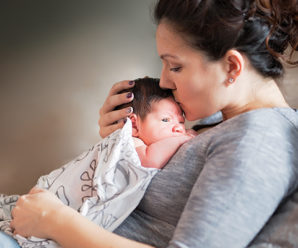
Pregnancy is a time of joy but also may be a time of fear for expecting parents. Your regular world –from deli in the store, to a rollercoaster – instantly transforms into a virtual circus of red flags for expecting moms.
You don’t have to hibernate for 40 weeks, but Maternal-Fetal Medicine Provider Maria Mascola recommends a few lifestyle and health-related habits to help with birth defects prevention.
Assess your prescriptions
Review your current prescriptions with your women’s health provider and don’t take any new medications, including herbals and supplements without confirming with your OB/GYN and pharmacist that they won’t harm your developing baby.
Marshfield Clinic Health System shares a printable safe medication list for pregnancy to help with any unwanted symptoms like nausea, headaches and constipation.
Quit smoking and alcohol use
Smoking is known to be associated with certain birth defects, and no amount of alcohol has been proven baby-safe enough to drink during pregnancy.
“Many women become pregnant and have some unhealthy habits to kick – you’re not alone. Your privacy and confidentiality are very important to us, and it’s key to trust your obstetrics provider and feel comfortable bringing these issues up,” Dr. Mascola said. “Ask about what habits should change, and ask for help; there are so many resources out there to help pregnant moms.”
Manage diabetes
Babies born to mothers with diabetes have a much higher risk of birth defects. If you have diabetes, it is truly best to have your blood sugars under control before becoming pregnant.
“It is not uncommon to develop diabetes during pregnancy as well,” said Dr. Mascola. “There are lifestyle and medical changes you can make to reduce risk to your baby or with future pregnancies. Talking with your provider ahead of time will help avoid many diabetes-related birth defects. Also, we can see patients for preconception consults if there are medical issues or other concerns they want to discuss prior to pregnancy.”
Be careful with meats
Undercooked meat can carry Listeria, which can lead to miscarriage and stillbirth. Babies born to moms with Listeriosis can experience serious birth defects, such as blood infections or organ lesions. Toxoplasmosis is a parasitic infection that also can lurk in undercooked meats. Additionally, toxoplasma can be found in soil. Better to use gloves when gardening than to try to scrub the dirt off and out from under nail.
Dr. Mascola advises cooking meats thoroughly, to an internal temperature of 165 degrees, or steaming hot and always erring on the side of caution with many of the items at the deli counter (meat or not), as Listeria outbreaks have been linked to salad bars and improperly washed fruits and vegetables.
She also recommends caution with certain types of fish. “In general, fish is high in nutrients, especially certain important fatty acids, so women may eat 8-12 ounces of fish per week,” Mascola said. “However large predator fish such as shark, swordfish, tuna and tilefish can concentrate mercury which can be harmful to a developing baby’s brain. So it’s best to focus on eating fish with low mercury content. The FDA’s website has a really useful table to help decide which fish are best.
Most local fish in Wisconsin are considered safe but it varies by lake and region so best to check a reliable source of information such as Wisconsin DNR.”
Check the Wisconsin Department of Natural Resources website for safe eating tips for fish caught in local waters. However, discuss with your provider if you are not sure.
Wash your fruits and veggies
Harmful bacteria linked to birth defects also are found on some fruits and veggies if they’ve touched manure. Wash but don’t avoid these foods because they’re good for a pregnant mom’s diet.
Let someone else clean the cat litter
Toxoplasma lurks in the feces of some infected cats. Pregnant women have reduced immunity, making them more vulnerable. Let someone else pull scoop duty to help prevent birth defects.
Wash your hands
Scrubbing your hands can fend off a slew of potential hazards to your unborn baby, most notably, toxoplasmosis but also things like Hepatitis and influenza virus.
Take your prenatal vitamin
“Get your recommended 400 mcg of folic acid every day,” Dr. Mascola said. “It can help prevent two serious birth defects: anencephaly and spina bifida.”
Travel carefully
Even if you’re trying to conceive, thoroughly research your travel destination before you go. Zika and other contagious viruses in some regions can pose significant health risks to your unborn baby.
Stay on track with vaccinations
Being up-to-date on current vaccination recommendations can help keep your baby safe. Certain infections that can be prevented with vaccines may cause serious birth defects. Pertussis, influenza and COVID-19 are all vaccines you can receive while pregnant.
Know your family history
Have knowledge of your family’s history of birth defects and medical problems and convey that information to your women’s health provider.
“Our Medical Genetics colleagues are available to discuss family history of a whole range of genetic conditions and help our patients decide which testing they may want to do to learn more about whether there is any risk for the pregnancy,” Dr. Mascola said.
Don’t skip appointments
“Your women’s health provider will help educate you about these and other birth defects prevention tips and stay on track,” she said. “Not all are preventable, but you can significantly reduce your risk by taking certain steps.”
If you are pregnant or planning to conceive, schedule an appointment with your women’s health provider.






Leave a Reply